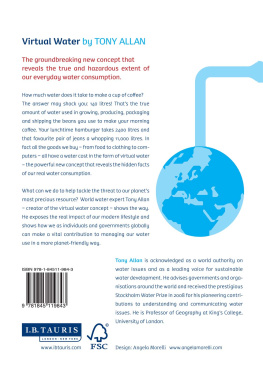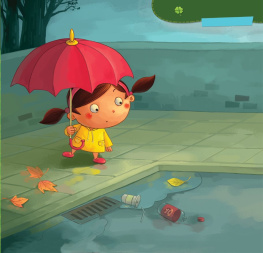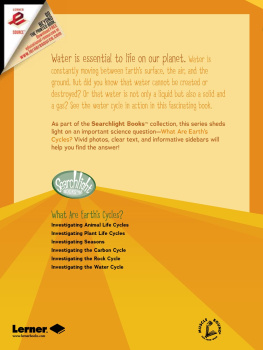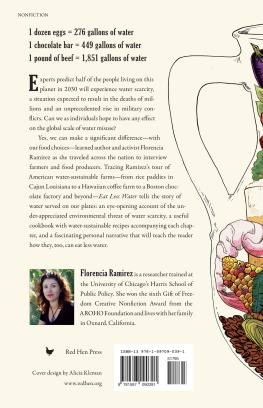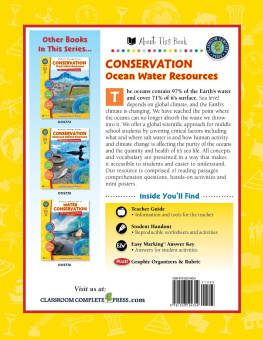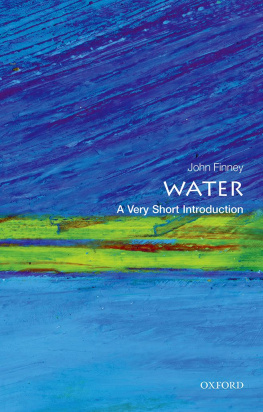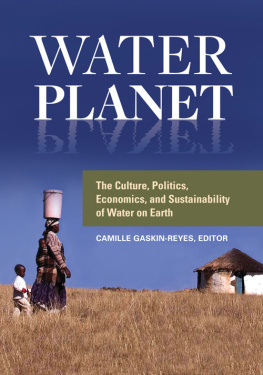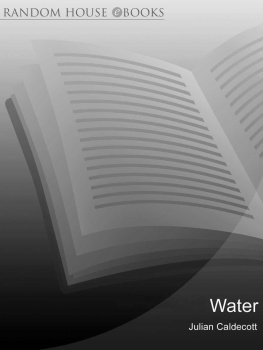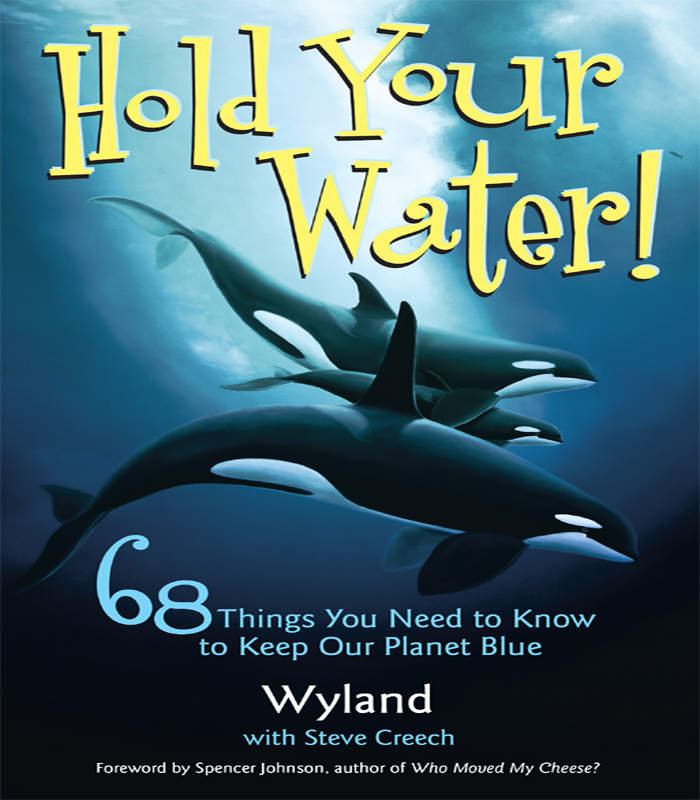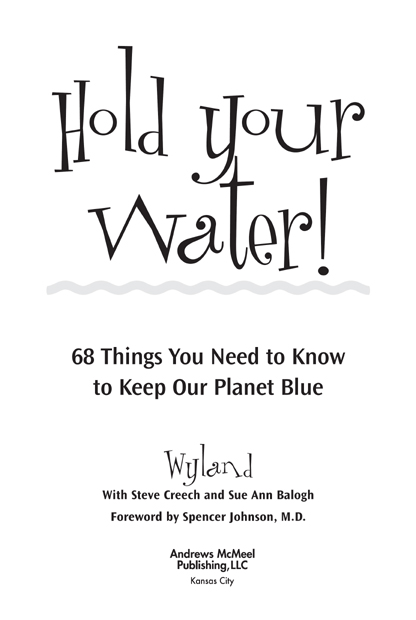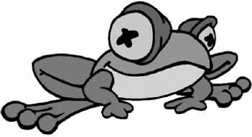Contents
Part I
Getting Your Feet Wet
Part II:
What Are You Calling a Bad Habit?
Part III
Go with the Flow
Part IV
A Global View
Part V
Strange Weather Ahead
Foreword
Wylands Changing World of Water
Water and Wyland go together. And we can all benefit from it!
Water is the most precious life-supporting resource we have. And Wyland, the worlds leading marine artist, has a passion for restoring pure water to the earth that is unparalleled.
You may remember when an abundance of pure drinking water flowed from our faucets at home, and it was practically free.
I t is our task in our time and in our generation, to hand down undiminished to those who come after us, as was handed down to us by those who went before, the natural wealth and beauty which is ours.
JOHN F. KENNEDY
A lot about water has changed. Like most changes, it happened a little bit at a time. As you will read, many people did a few thoughtless little things that didnt seem to matter. But they added up and reduced the purity of our cities water supplies and thus reduced the quality of the water we drink.
C lean water and healthy oceans will be one of the most important issues of the next century.
WYLAND
Not that many years ago, very few of us thought we would ever go to the market and pay good money for bottles of drinking water. Yet it is happening.
Now, in Wylands wonderful book, you can discover not only how water has changed, but how you can change, and help us regain our clear water.
In the Tips sections of the book, you will see how each of us can easily do some little things differently in our own livesthings that will add up and make a big difference to our regaining a clean water supply.
Hold Your Water may be a strange title for a book, but the content is terrific. Then again, who am I to talk about unusual book titles?
Spencer Johnson, M.D.,
Author, Who Moved My Cheese?:
An A-Mazing Way to Deal with Change
E very man, woman, and child is a small river 70 percent of our bodies is water. A 1 percent deficiency of water in our body makes us thirsty, 5 percent causes a slight fever, and at 10 percent we become immobile. A 12 percent loss of water and we die.
PETER SWANSON , Water: The Drop of Life, 2001
Preface
How do you make a difference? How do you leave a legacy of a healthy environment for future generations? What if you realized that you could change the world by changing a habit here or there? What if you read a newspaper and suddenly realized that two seemingly different issues, say, the kind of household cleaners you use and the health of a local stream, were very closely linked together? The fact is you dont need to be an activist or a scientist to make a difference. Right now, the future of our planet needs everybody: teachers, engineers, doctors, administrators, accountants, biologists, mechanics, students, athletes, artists, writers, lawyers, and fishermen. No one is excluded. They cant be. Why? Because people from all walks of life will shape the world of tomorrow. The decisions each of us makes today will change the face of the planet in twenty years.
Hold Your Water! 68 Things You Need to Know to Keep Our Planet Blue was written for people like you. Its a quickand fascinatinglook at the many different ways human activity impacts the health of water around the world. We explore the latest news, technologies, and facts about our world of water, but most important, we try to provide answers and solutions. Some of these might be as simple as cleaning up pet waste or reducing your carbon footprint (dont worry, well explain more about that later). Other solutions include tips on making your voice heard by lawmakers and other decision makers.
Ive spent my life creating monumental works of art to raise awareness about the beauty and importance of marine life habitats. Ive met with leaders around the world who are concerned about the health of our oceans, lakes, streams, and wetlands. And Ive worked with people behind the scenesthe ones who get things done. These are extraordinary people doing extraordinary work. But what amazes me most about many of these people is that they are constantly learning and striving for a better understanding of our environment and how we can live in harmony with our planet.
That is what we hope to accomplish with this book. You can read a page here or a page there. You can start at the back and work your way to the front. There is no right or wrong way. If youre a person who wants to make changes right now, weve added appendixes with dozens of tips, so you can find new ways that you can change habits at home. The good news is that you, as an educated consumer, have the power to change things for the better. Your kids do, too. If it starts with this book, all the better. Hopefully, if youre like me, youll discover the connections that lead to one of those aha! moments. Once that happens, youre on your way.
Wyland
Acknowledgments
The Wyland Foundation has discovered that there is a widespread lack of knowledge about the delicate and intricate nature of ecosystems and the connection between what we do as humans and the impact on our oceans, lakes, rivers, streams, ponds, and wetlands. The Ocean Projects National Survey (1999) found that when asked to choose the main source of ocean pollution among three sources, only 14 percent of Americans selected the correct answerrunoff from yards, pavement, and farms. The same survey also showed that 45 percent of Americans agreed with the statement What I do in my life doesnt impact ocean health much at all.
Since 1993, the Wyland Foundation has addressed these issues by creating memorable and educational art and science experiences for people of all ages that have lasting impact. Through live events, classroom programs, community outreach programs, and public art, the foundation builds layers of knowledge, understanding, and empathy to inspire the public to act as better stewards of their coasts and water resources. Just as important, we hope to instill an understanding of human impacts on our water with a particular emphasis on nonpoint pollution problems and solutions.
These goals could not be achieved without the tireless efforts of world-class science institutions, such as our educational partners, the Scripps Institution of Oceanography (UCSD) and the Birch Aquarium at Scripps, where scientists are currently codeveloping the Wyland Ocean Challenge, Clean Water for the 21st Century and Beyond, a free nationwide classroom education program. By bringing together groups from far-reaching disciplines in art, science, and conservation, we have an opportunity to fundamentally change perceptions of a healthy environment. We can demonstrate the valueand the beautyof our planet, and encourage preservation for future generations. Joining us in these efforts are the American Zoo and Aquarium Association, Project AWARE, and the Surfrider Foundation, as well as hundreds of community service organizations, companies, and concerned citizens.


